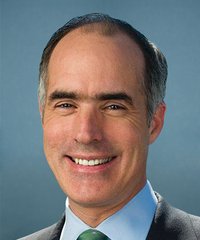
He is a strong advocate for policies that will raise wages for the middle class and improve early learning opportunities and health care for children. Senator Casey serves on four committees, including the Finance Committee, the HELP Committee, and the Select Committee on Intelligence. He is also the Chairman of the Special Committee on Aging, where his agenda is focused on policies that support seniors and individuals with disabilities.
Born and raised in Scranton, Pennsylvania, Senator Casey graduated from The College of the Holy Cross in 1982, and spent the following year teaching fifth grade and coaching eighth grade basketball in inner city Philadelphia for the Jesuit Volunteer Corps. He received his law degree from Catholic University in 1988, and entered the practice of law in Scranton. Senator Casey and his wife, Terese, live in Scranton and have four adult daughters.
Safe, secure communities are vital to the well-being of Pennsylvania families, yet criminal activity threatens public safety in many areas of the Commonwealth. Senator Casey believes the most effective way to fight crime is to ensure state and local law enforcement have the necessary resources they need to proactively prevent crime while bringing perpetrators to justice. Our brave law enforcement officers are doing all they can to combat crime, but they need adequate resources to do their jobs. Funding these law enforcement programs will put more cops on the beat and ensure that our officers have the equipment they need to keep Pennsylvanians safe.
Since arriving in the Senate, Senator Casey has supported common-sense, bipartisan legislation to address violent crime, drug abuse, and related crime. He has worked to increase funding and federal support for Pennsylvania law enforcement to help them obtain innovative crime-fighting technology and bulletproof vests so they can do their jobs safely and effectively. He has also introduced legislation that will combat witness intimidation that obstructs justice, and supported the creation of a national commission to identify ways in which our criminal justice system could be improved to better serve citizens across the Commonwealth and the nation.
Criminal activity begins in the places where the community structures holding families and neighborhoods together begin to fall apart. Senator Casey has supported numerous efforts to build stronger communities in Pennsylvania and around the country. Specifically, he has consistently advocated for the expansion of the Community Development Block Grant Program, run by the Department of Housing and Urban Development, which is crucial to the rebuilding and revitalization of our communities. This program generates economic stability by creating jobs, promoting entrepreneurship, and encouraging home ownership, fostering a climate in which strong communities can grow and prevent criminal activity from taking root.
In April 2013, Senator Casey voted in support of a number of commonsense proposals to reduce gun violence, including expanded background checks, restrictions on certain military-style assault weapons and improvements to mental health screening and treatment programs. In light of the 2012 tragedy at Sandy Hook Elementary in which 20 children lost their lives, Senator Casey is committed to protecting our children while simultaneously defending of the Second Amendment and the strong Pennsylvania tradition of responsible gun ownership for purposes including sporting, collection and personal defense.
To provide more resources to local law enforcement, Senator Casey has been a strong advocate for increased funding for the COPS program and the Edward Byrne Memorial Justice Assistance Grant program (Byrne JAG) that provides flexible grants for law enforcement to prevent and prosecute crime. Senator Casey offered an amendment to the Senate Fiscal Year 2014 budget to increase funding for Byrne JAG which passed the Senate by voice vote.
In 2012, Senator Casey cosponsored and voted for the National Criminal Justice Commission Act, which would provide for the first comprehensive review of the federal criminal justice system in almost 50 years.
Senator Casey supported the Fiscal Year 2014 Senate Transportation, Housing and Urban Development Appropriations bill which would fund Community Development Block Grants at $3.15 billion for the upcoming fiscal year. The bill is in part aimed at compensating for large program cuts made over the past three years that limit grant funding to essential community services.